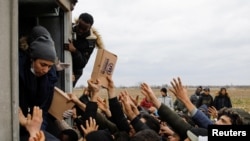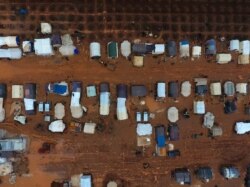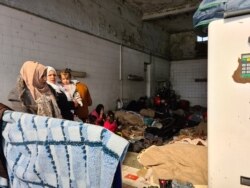The U.N. refugee agency reports hundreds of thousands of Syrian refugees in neighboring countries of asylum are in dire straits because of the economic fallout from the COVID-19 pandemic.
Five countries — Egypt, Iraq, Jordan, Lebanon and Turkey — are hosting more than 5.5 million Syrians, the biggest refugee group in the world. Many of the refugees live below the poverty line and have difficulty eking out a living.
The U.N. refugee agency reports an increasing number of refugees have lost their already meager incomes because of the economic downturn caused by the COVID-19 pandemic, forcing them to take drastic measures to survive.
UNHCR spokesman, Andrej Mahecic, tells VOA that female headed households, unaccompanied or separated children, the disabled and elderly are particularly vulnerable.
“The risks of the exploitation and abuse for people in such situations is serious. We are very concerned about that," he said. "We have evidence of people trying to skip meals in order to spread out the food so it can last longer. They may skip taking medication, everything that is considered right now something where they can cut costs.”
The UNHCR reports nine out of ten Syrian refugees in the region live in towns or villages and not in camps. Mahecic says most live in low-income areas where they compete with the local population for low-skilled jobs.
“Refugee households are taking on additional debt and are not able to pay their rent anymore," he said. "Serious protection risks are also growing, including risks of child labor, gender-based violence, early marriage and other forms of exploitation.”
In addition to the families already identified as vulnerable, Mahecic says the impact of the pandemic has rendered another 200,000 refugees in need of emergency aid. He says the UNHCR has provided emergency cash to support this extra refugee load in the five countries of asylum.
He says more money will be required to meet additional COVID-related needs. He notes preparations are underway for a pledging conference to garner the funds required to help millions of Syrian refugees and the countries hosting them.



